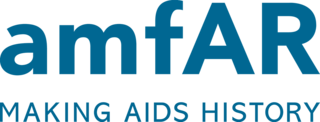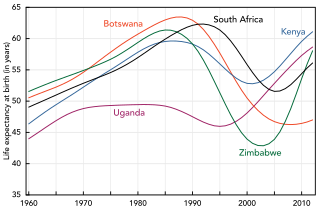
The AIDS epidemic, caused by HIV, found its way to the United States between the 1970s and 1980s, but was first noticed after doctors discovered clusters of Kaposi's sarcoma and pneumocystis pneumonia in homosexual men in Los Angeles, New York City, and San Francisco in 1981. Treatment of HIV/AIDS is primarily via the use of multiple antiretroviral drugs, and education programs to help people avoid infection.

HIV/AIDS originated in Africa during the early 20th century and has been a major public health concern and cause of death in many African countries. AIDS rates varies significantly between countries, though the majority of cases are concentrated in Southern Africa. Although the continent is home to about 15.2 percent of the world's population, more than two-thirds of the total population infected worldwide – some 35 million people – were Africans, of whom 15 million have already died. Eastern and Southern Africa alone accounted for an estimate of 60 percent of all people living with HIV and 70 percent of all AIDS deaths in 2011. The countries of Eastern and Southern Africa are most affected, AIDS has raised death rates and lowered life expectancy among adults between the ages of 20 and 49 by about twenty years. Furthermore, the life expectancy in many parts of Africa is declining, largely as a result of the HIV/AIDS epidemic with life-expectancy in some countries reaching as low as thirty-nine years.

The International AIDS Vaccine Initiative (IAVI) is a global not-for-profit, public-private partnership working to accelerate the development of vaccines to prevent HIV infection and AIDS. IAVI researches and develops vaccine candidates, conducts policy analyses, serves as an advocate for the HIV prevention field and engages communities in the trial process and AIDS vaccine education. The organization takes a comprehensive approach to HIV and AIDS that supports existing HIV prevention and treatment programs while emphasizing the need for new AIDS prevention tools. It also works to ensure that future vaccines will be accessible to all who need them.
FHI 360 is a nonprofit human development organization based in North Carolina. FHI 360 operates in more than 70 countries and all U.S. states and territories. Established in 1971, the organization manages projects relating to family planning and reproductive health. In 1986 the organization began a worldwide response to HIV/AIDS. FHI 360's research and programs also address malaria, tuberculosis, and other infectious and chronic diseases and international agencies, governments, foundations, research institutions, and individual donors.

amfAR, the Foundation for AIDS Research, known until 2005 as the American Foundation for AIDS Research, is an international nonprofit organization dedicated to the support of AIDS research, HIV prevention, treatment education, and the advocacy of AIDS-related public policy.

HIV/AIDS in India is an epidemic. The National AIDS Control Organisation (NACO) estimated that 2.14 million people lived with HIV/AIDS in India in 2017. Despite being home to the world's third-largest population of persons with HIV/AIDS, the AIDS prevalence rate in India is lower than that of many other countries. In 2016, India's AIDS prevalence rate stood at approximately 0.30%—the 80th highest in the world. Treatment of HIV/AIDS is primarily via a "drug cocktail" of antiretroviral drugs and education programs to help people avoid infection.

The Elton John AIDS Foundation (EJAF) is a nonprofit organization, established by musician Sir Elton John in 1992 in the United States and 1993 in the United Kingdom to support innovative HIV prevention, education programs, direct care and support services to people living with or at risk of HIV. It has raised over $565 million to support HIV-related programs across ninety countries.

The Durbar Mahila Samanwaya Committee, or simply Durbar, is a collective of 65,000 sex workers in West Bengal. Established on 15 February 1992, in Sonagachi, the largest red-light district in Kolkata, West Bengal, India with estimated 11,000 sex workers, Durbar has been working on women's rights and sex workers' rights advocacy, anti-human trafficking and HIV/AIDS prevention. The Durbar states that its aims are the challenging and altering of the barriers that form the everyday reality of sex workers' lives as they relate to their poverty or their ostracism. Durbar runs 51 free clinics for sex workers across West Bengal, with support from organisations such as the Ford Foundation and the National AIDS Control Organisation (NACO), who also help Durbar in its initiatives like networking, rights protection and creating alternative livelihood for sex workers.
NMAC, formerly known as the National Minority AIDS Council, is a nonprofit organization that works for health equity and racial justice to end the HIV epidemic in America. The nonprofit organization, located in Washington, D.C. was founded in 1987. The organization changed it's vision and mission in 2015 to reflect their efforts better. NMAC represents over 3,000 community and faith-based organizations across the US. The agency advances its mission by providing minority and minority-serving faith and community based organizations with capacity building assistance programs, online and classroom-based trainings, printed and electronic resources, grassroots organization and political advocacy. These activities improve the delivery of HIV/AIDS services, helping to mitigate the impact of HIV/AIDS in underserved and marginalized communities.

HIV/AIDS affects economic growth by reducing the availability of human capital. Without proper prevention, nutrition, health care and medicine that is available in developing countries, large numbers of people are developing AIDS.

HIV/AIDS was first detected in Canada in 1982. In 2018, there were approximately 62,050 people living with HIV/AIDS in Canada. It was estimated that 8,300 people were living with undiagnosed HIV in 2018. Mortality has decreased due to medical advances against HIV/AIDS, especially highly active antiretroviral therapy (HAART).

Nimmagadda Prasad is an Indian industrialist from Andhra Pradesh, India. He is known for his ventures in the Pharmaceutical and Television industries, and is involved in philanthropic activities through Nimmagadda Foundation.
The Portal was a Baltimore LGBT community center for LGBT African Americans in the Baltimore, Maryland metropolitan area. It was owned and maintained by Empowering New Concepts, Inc. ENC, Inc. is a non-profit, 501(c)(3) community based organization established in 2001 by current CEO Rickie Green. Intended as a safe place for LGBT people of color, they offered health and safety information including AIDS awareness. The Portal "promotes stronger, more effective same gender loving communities of color through access to quality healthcare and economic and educational services." They served men who have sex with men as well as women who have sex with women.
The Naz Foundation (India) Trust is a non-governmental organisation (NGO) in that country that works on HIV/AIDS and sexual health. It is based in the Indian capital of New Delhi.
The Desmond Tutu HIV Foundation (DTHF) is a nonprofit organization founded to provide treatment for and conduct HIV/AIDS research. It is based in Cape Town, South Africa, and is managed with the Desmond Tutu HIV Centre at the University of Cape Town. The Foundation operates community sites throughout greater Cape Town, providing treatment, testing, and outreach services to at-risk communities.

Swami Vivekananda Youth Movement (SVYM) is a development organization founded by a group of medicos led by Dr R Balasubramaniam based in Saragur near Mysore in the Indian state of Karnataka. The organization is engaged in building a new civil society in India through its grassroots to policy-level action in health, education and community development. For tribal They have been recognized by private and government bodies inside and outside of Karnataka. Their work in the field of AIDS prevention was recognized by the Indian government. They received awards such as the 'National Youth Award' from the Indian government, and the Mahaveer Award for work in Community and Social Service from the Mahaveer Foundation.

The San Francisco AIDS Foundation (SFAF) is a nonprofit organization dedicated to providing services for people with HIV/AIDS, with a mission to end the AIDS epidemic in the United States. They were founded in 1982, at the beginning of the AIDS epidemic. SFAF is one of the largest and oldest community-based AIDS service organizations in the United States. SFAF has an 87.67% overall rating, and a 97% accountability & transparency rating, at Charity Navigator.
Suniti Solomon was an Indian physician and microbiologist who pioneered AIDS research and prevention in India after having diagnosed the first Indian AIDS cases among the Chennai sex workers in 1986 along with her student Sellappan Nirmala. She founded the Y R Gaitonde Centre for AIDS Research and Education in Chennai. The Indian government conferred the National Women Bio-scientist Award on her. On 25 January 2017, the Government of India awarded her the Padma Shri for medicine for her contributions towards diagnosis and treatment of HIV.

Linda-Gail Bekker MBChB, DTMH, DCH, FCP(SA) is a Professor of Medicine and Chief Operating Officer of the Desmond Tutu HIV Foundation. She is also Director of the Desmund Tutu HIV Centre at the University of Cape Town. She is a Past President of the International AIDS Society (2016-18).